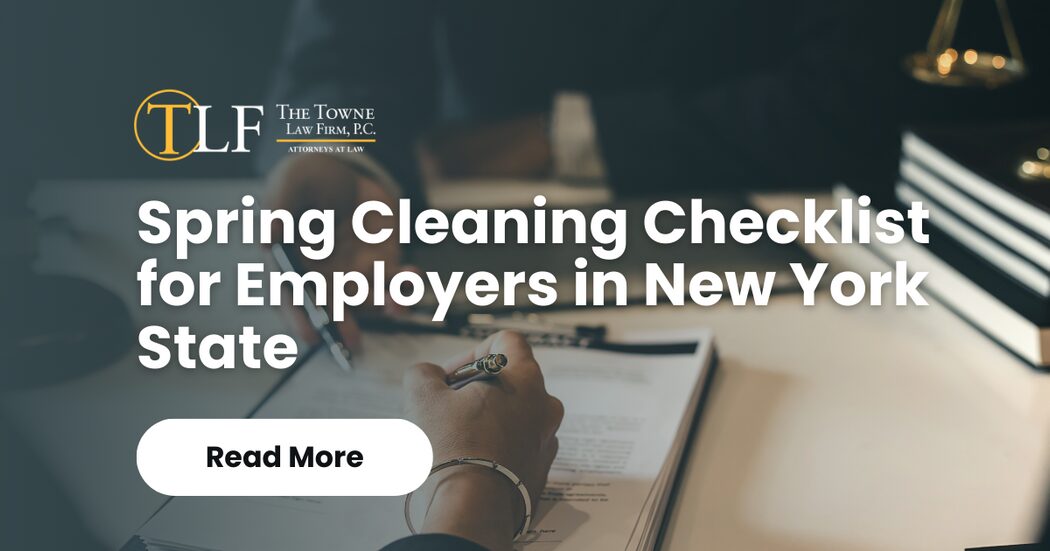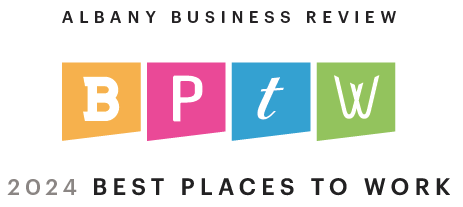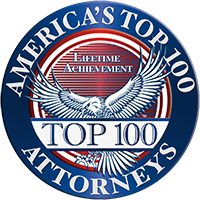Spring Cleaning Checklist for Employers in New York State
May 3, 2024ALBANY, NY | As spring ushers in new beginnings and fresh perspectives, it also brings a bouquet of updates to New York State’s labor and employment laws. From pay practices to workplace accommodations, these changes paint a vivid picture of evolving regulations designed to protect and empower both employers and employees alike. It’s important for employers to stay aware of these legal shifts as it’s paramount for businesses to navigate the delicate balance between compliance and efficiency. Join us as we dive into the most recent and prominent updates, examining their implications and what they mean for your organizations’ spring cleaning agenda!
The Pregnant Workers Fairness Act, effective federally June 18, 2024, mandates accommodations for pregnancy, childbirth, related medical conditions, and fertility treatments. Employers with 15 or more employees are required to provide “reasonable accommodations” for known pregnancy, childbirth, or related medical conditions, which may include fertility and infertility treatments unless it poses an undue hardship on the employer.
New York State’s updates to settlement agreements, particularly regarding confidentiality provisions, were signed into law on November 17, 2023. These changes affect employers’ inclusion of nondisclosure provisions in settlement agreements resolving discrimination or harassment claims. The law prohibits several practices, including mandating payment from complainants for breaching nondisclosure or nondisparagement provisions, forfeiting settlement for breach, or affirming the complainant’s non-experience of discrimination or retaliation. It also modifies existing requirements, extending coverage to independent contractors settling discrimination claims.
The “Freelance Isn’t Free Act” mandates that businesses provide freelance workers with a written contract for work exceeding $800, including a payment deadline if not specified in the contract. Regarding anti-retaliation provisions, freelancers are empowered to file complaints with the New York State Department of Labor (NYSDOL) for investigation. This law comes into effect on May 20, 2024, with no retroactive application to contracts entered into before that date.
Effective March 12, 2024, employee social media protections prohibit employers from requesting, requiring, or coercing employees or job applicants to disclose their personal account usernames, login information, or passwords. Additionally, employers cannot compel individuals to access their personal accounts in their presence or reproduce any content from these accounts. Such demands cannot be made as conditions for hiring, employment continuation, or disciplinary actions. However, there are exemptions: employers may request access information to business accounts if employees were given prior notice, or for accounts known to be used for business purposes. Additionally, employers can access devices paid for by the employer if such access was conditioned upon notice and agreement. In anticipation of the law, employers should review electronic communications policies, prepare Bring Your Own Device policies, and ensure that application materials comply. Training for management and human resources professionals on permissible inquiry scopes during disciplinary investigations is also advisable.
Effective March 13, 2024, there is an increase in the salary threshold governing certain exemptions under Article 6 of the New York Labor Law (NYLL) from $900 per week ($46,800 per year) to $1,300 per week ($67,600 per year). Article 6 ensures wage protections for employees, including obligations such as paying clerical or other workers at least semi-monthly, obtaining advanced written consent before paying wages via direct deposit, and facing misdemeanor charges if benefits or wage supplements are not provided within 30 days of being due.
Filing unlawful discrimination claims in New York has undergone changes. For incidents occurring on or after February 15, 2024, claims can be filed within three years of the alleged discrimination. However, incidents before February 14, 2024, still require filing within one year, or three years for sexual harassment in employment.
Revised regulations under the New York State Worker Adjustment and Retraining Notification (WARN) Act have brought significant changes. WARN requires employers to give a 90-day notice to the affected employees and both state and local representatives before a plant closing or mass layoff. Effective immediately as of the end of June 2023, these amendments align with updates made to the NY WARN Act in 2021 and address unique challenges posed by the COVID-19 pandemic. Notably, remote workers are now included in determining coverage, encompassing individuals based at the employment site but working remotely. The process for seeking exceptions has been updated, requiring employers to obtain a determination from the NYSDOL Commissioner of Labor that all criteria for the claimed exemption have been met.
Effective September 6, 2023, amendments to the New York criminal larceny statute now encompass “wage theft” as a form of larceny. This expansion introduces the concept of “larceny by wage theft,” occurring when a person hires someone to perform services, the services are rendered, yet the wages, at least minimum wage and overtime or promised wage if greater, are not paid for the work performed.
Effective September 6, 2023, employers are prohibited from mandating employee attendance at employer-sponsored meetings primarily focused on communicating the employer’s views on religious or political matters. Furthermore, employers cannot retaliate against employees who decline to listen to or view such communications. The law defines “political matters” as those related to elections, political parties, legislation, regulation, and decisions regarding political or civic organizations. Similarly, “religious matters” encompass topics concerning religious affiliation, practice, and decisions regarding religious organizations.
In June 2023, the New York State Assembly and New York State Senate passed a bill aimed at banning non-competition agreements, pending approval from Governor Hochul. Subsequently, in November 2023, Governor Hochul emphasized the importance of safeguarding low- to middle-income workers while allowing high-income workers autonomy in their decisions regarding competition. However, in December 2023, Governor Hochul vetoed the bill, asserting her support for non-compete legislation that protects “middle-class and low-wage workers” but opposes a “one-size-fits-all approach.”
In the ever-evolving landscape of labor and employment law, staying informed is not just a legal obligation but a strategic advantage. As we wrap up our “spring cleaning” review of the latest updates in New York State, it’s clear that vigilance and adaptability are key. By proactively integrating these changes into your policies and practices, you not only mitigate risk but also foster a culture of compliance and fairness within your organization.
Contact The Towne Law Firm, P.C. today to consult with one of our seasoned Labor and Employment Attorneys.
The Towne Law Firm, P.C. represents clients in all aspects of labor and employment law, from complex litigation to routine advice on human resource matters. Our attorneys are experienced in advising and representing employers and employees in a variety of work environments in both the private and public sectors in arbitration, negotiating, and representing clients in administrative hearings.
LEARN MORE Share














